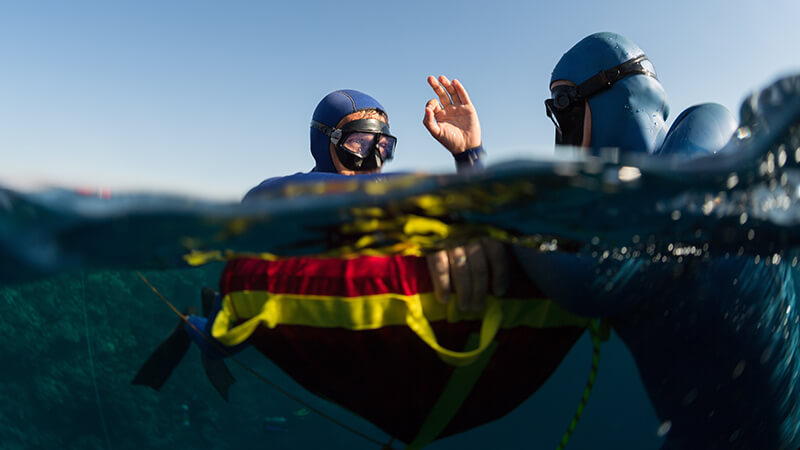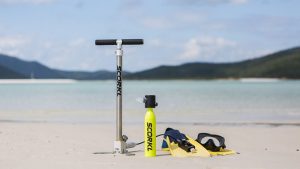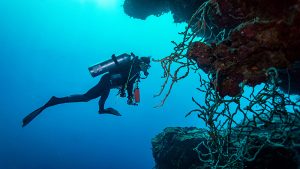What should divers do for their own safety? This is question is frequently asked, by both advanced and beginner divers.
There are many scuba diving dangers. However, if you are well prepared, you do not have to encounter even one of them. It is possible to dive frequently, for decades, without encountering a big risk when you are in the bowels of the ocean.
After taking your PADI or NAUI diving course, you will feel confident enough to dive on your own. After all, these certifications equip you with the basics of scuba diving, as well as scuba diving safety techniques that you should know. That is why you pay a cost to get these certifications.
Always know that your diving safety depends on you. To ensure that you come out of the water alive, you will need to take deliberate steps for personal diving safety.
Well, if you are a diver, you know the exhilarating feeling of buoyancy and weightlessness that you feel in the water. Only astronauts experience such a feeling when they are in space. It is hard to imagine that such an environment can be marred by dangers.
The truth is that there are so many scuba diving safety risks. Tell you what though … with just a few safety checks, you should be able to enjoy yourself tremendously, without facing any serious risk or scuba diving dangers.
Start working on your safety using the tips in this post.
Scuba diving safety checks for all diverz
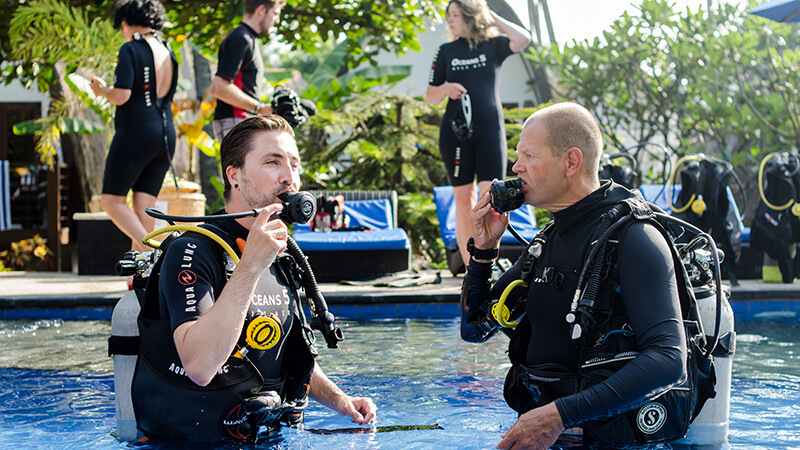
Plan the dive in advance
Everything about your scuba diving safety starts here. If you get the planning wrong, you will increase the risk of your scuba dive. Thankfully, there are many resources on amazon.com and other places to help you plan your dive.
The first thing you ought to do is find out everything about the waters where you intend to dive. Is it cold water or warm water diving? This will enable you to get your scuba diving safety gear. For example, 2mm scuba diving wetsuits are best for warm water diving.
5mm, 7mm and thicker wetsuits for scuba diving are good for cold water diving. The same case applies to the diving gloves that you will wear.
Once you know the waters, you can choose the best gear for diving correctly. Another thing that you ought to find out is the currents. Some places are just not safe for diving.
You should also find out the laws controlling diving for wherever you are going. You will find that these laws differ from place to place. In many places though, you need to have a diver down flag so that other people can be aware there is a diver down.
Another thing that you ought to know is the kind of animals you can expect to find wherever you are going diving. You may also need to know what kind of distance you need to keep, and how to behave when you are close to the animals.
Before you go diving, you should have all the local emergency numbers. Also, make sure you have your medical card, and travel insurance if you have traveled out of your country.
The thing is… when scuba diving, you can never be too careful.
You must be healthy enough to dive
Well, there is no maximum age limit for scuba diving. However, as a diver, you also know that it would not be cool to take unnecessary risks in the depths of the ocean. The probability of risk increases if you are unhealthy for diving.
Thus, if you have any preexisting conditions such as asthma, you need to talk to your doctor first, before you can attempt diving. You also need to consult your physician if you are pregnant, even if you are in the first week.
If you have diabetes, find out whether you are allowed to dive. The reason for this is that under the water, you really do not know all the changes that are taking place in your body. For example you do not know how your metabolic rate is going to change, or your oxygen transportation to the vital organs.
The most important thing is … speak to your doctor. Even if you have chronic health issues such as back pain, you need to know whether it is safe to dive.
Scuba diving safety starts with how safe you are feeling with yourself. If you think that your blocked nose will hinder your enjoyment in the water, do not do it. You can always wait.
But being healthy enough for scuba diving is not just about being free of illnesses. You should be of excellent physical fitness too. You may require to do some swimming, and besides, you do want to be able to help your diving buddy if they should get into trouble.
Diving gear is also heavy. Remember the scuba diving tank, scuba diving knife and others. You need to be physically sound to carry all that on your back as you wait to dive off the boat.
Know your limits before you dive
Every person has his or her limits. After taking a few successful dives, you will feel very confident enough to dive on your own.
That is not always a good idea especially for beginner divers. Thus, if you completed your diving training just recently, do not go diving alone. Have a diving buddy with you, or you can dive with a group.
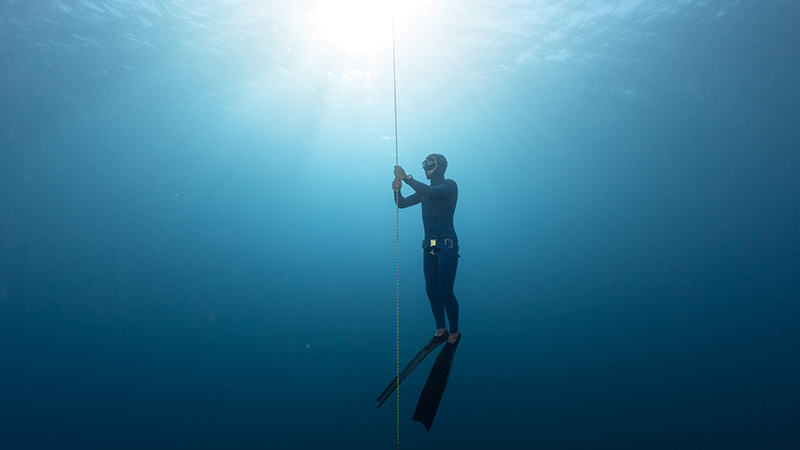
Diving guide for cave diving
Another thing that you ought to know is that even when you are an expert, some types of dives could be tricky. For example, cave diving can be dangerous especially to a person who is diving the caves for the first time.
In such a case, you should dive with a guide. It would also help if you obey the guide and do what he/she instructs.
Other dives that may require you to dive with a guide include shipwreck dives. They are not as bad as the cave dives. But if you do not feel confident enough to do it alone, dive with a guide. Most advanced divers though do not need assistance, as they will have acquainted themselves with many similar situations.
Knowing your limits for scuba diving safety is going to keep you alive. It is also going to give you the best experience under the water. Just know the limits of a beginner, intermediate or an advanced diver.
Never exceed your maximum diving depth
Every diver has a maximum depth to which he/she can dive. (How deep can a human dive) It is very important that you do not exceed this limit no matter how tempted you feel. At the same time, stick tooth and nails to your dive plan. Do not exceed the time you should be down there.
Know the time that you can stay under the water. You also need to know the level/depth to which you can dive and the amount of time that you can stay there. Thankfully, you can use special computer programs to calculate the amount of time that you should spend at 60 feet, and so on. Remember to wear your scuba divers watch so that you can know when your time is up.
Just make sure you have the right scuba diving gear for the given type of dive.
Do a Thorough Pre-Dive Check
It is very important that you do a good pre-dive check before you get into the water. The first thing to do is to ensure that all of your scuba diving gear is working just fine. Now, just like any other gear, you should never use your diving items straight from storage.
Test everything in the swimming pool. You need to know whether your buoyancy control device is working alright. Make sure the air bladder is not leaking air. Testing your equipment should help you to know whether anything needs to be repaired.
Check the diving tank regulator to make sure it is working. The scuba diving mask should not let in water. Unless you get in the deeper end of the pool to test your diving gear, you cannot be fully assured of your scuba diving safety.
But it is not the BCD alone that you should check. Also check that the air tank is tightly strapped up in its harness. Accidents do happen when the air tank slips from its harness.
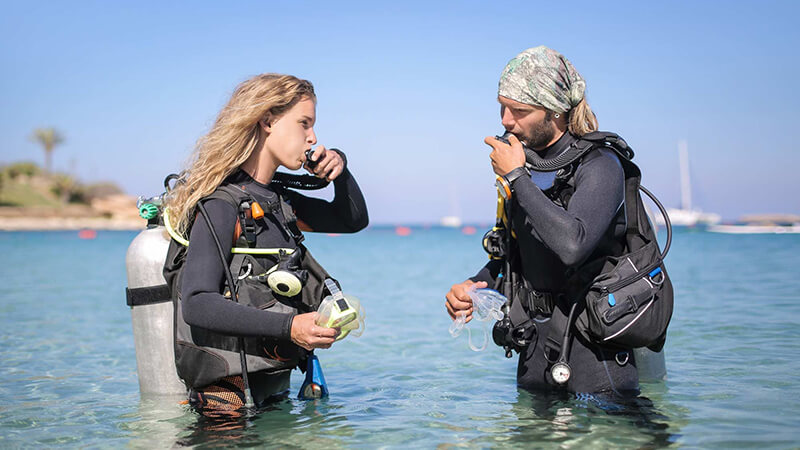
Go the whole Buddy Check – BWRAF
This (Buddy Check) is something that you learn when taking your dive certification training. It is actually abbreviated as BWRAF – Begin With Review And Friend. However, when checking out your gear, this abbreviation means something else altogether.
BCD – Start with the BCD as we have stated above. Just inflate and deflate the BCD, to make sure that it is working correctly. Confirm that all the release valves of the BCD are working. Also, make sure the over-inflation valve is working correctly to avoid scuba diving dangers.
Weights – The quick release of the weight belt should be fully closed. This eradicates all risk of having the belt snagging up on anything. Ensure that the quick release is working fine and that the weights are well arranged all around.
Releases – This means that any gear that is attached on the BCD should be secure and tight. This means everything, including the diving lights. Ensure the straps of the BCD are flat and securely buckled.
Air – You should ensure the tank is fully operational. This is a matter of life and death since you will need this air to breath under the water. The scuba tank air valve should open and close nicely without being forced in any way. Your dive buddy ought to take a full breath of your tank air to ensure it is working.
Final – This is for the “F” in BWRAF. It means checking everything else. Check that the diving fins fit nicely, the scuba mask is ok and that the gear is attached properly. Your scuba booties should be snug on your feet.
You should also listen to your gear, you know, feel whether your body tells you something is amiss. Once you are convinced you have done a perfect pre-dive check, you will be ready to dive.
Know the most serious scuba diving dangers
You cannot avoid something that you do not know. Thus, you cannot avoid scuba diving dangers if you do not know them.
The simplest mistakes are quite often the most dangerous for any diver. For example, holding your breath as you descend is quite hazardous. It can lead to air embolism.
Air embolism is the entry of air into the arteries due to pressure. This is bound to happen when you are ascending as the water pressure reduces, which results to the expansion of the air in your lungs.
When the air expands in the lungs, it can easily make the air sacs burst. These burst air sacs would then cause air to enter the arteries and travel through. This can cause your death fast, remember, it is air under pressure from the lungs and therefore it can easily cause the arteries to burst.
You should never hold the breath when you are scuba diving.
Bring your diver’s flag and boat
You will definitely need a boat to dive from. It can be a pontoon boat, or a even an inflatable kayak. However, note that the boat that you choose should be suitable for the water conditions. It is important that you avoid diving during stormy times. You should always know the weather forecasts for your diving destination before going.
It is also important that you come with a vessel that is brightly colored so that it can be seen from a distance. Most of the time, canoes and kayaks might be hard to spot for big boats.
You should have a diver’s flag that you leave where you are diving so that other boats, canoes and people can be notified that there is a diver under the water. It is important that you stay as close to the flag as possible. There is no sense at having a flag to warn other people that you are under the water, and then stray far.
Boats will steer clear of the flag, and so if you have strayed, they might unknowingly steer towards your direction. You could be at risk of having your head bashed by a hull or be sliced by the propeller.
“Break” new diving equipment first before using it
This is very important if you aim to beat scuba diving dangers. You should never buy new diving equipment, keep it in storage until the day of diving. Rather, you should break it. Just as you would wear your beach hiking shoes so that they can conform to your feet before you can take them to the beach, try out your new equipment.
You do not have to go to the sea to break your scuba equipment. Just use the deeper end of the pool. If you have bought a new scuba tank, you will want to ensure it is working. You should ensure the air valve is working just fine.
Try out the wetsuit before you can dive. Try the drysuit for diving in cold waters before the day of the dive. Try the scuba diving fins, the mask and everything else. That way, if anything needs to be returned, you can return it in good time.
Just remember that the most serious scuba diving dangers come from poor equipment. If you are taking your first dive, familiarize yourself with how the scuba diving gear works.
Look at your instruments
One of the safest tips for driving a car is to keep looking at the instruments. This is the same thing that you should do for diving. Look at your scuba diving computer to see the data of your dive. You need to know how much air you have left, whether you are at the right location as well as how much time you have left under the water.
Make sure you learn some diving sign language so that you can communicate with your dive buddy. When you are at half tank of air, let them be aware of that. Stay aware of their situation too. Keep in contact with each other. As soon as you get to the reserve tanks, it’s time to deflate that BCD and rise.
Stay aware of your surroundings
Many people get into accidents under the water just because they are not aware of their surroundings. With the kind of ocean pollution that has been going on for decades, just keep your eye peeled under the water. There could be fishing nets which could snag you up, wounded marine animals and many more dangers.
While diving is a tranquil water sport, it is flout with many dangers. It is best to acquaint yourself with as many of them as possible. That way, you will not be caught by surprise.
All the time that you are under the water, make sure you can see your dive buddy. You are their first option for help should they need it. Likewise, they are your first source of help if you should need it.
Hopefully, you will have done enough research about the area where you are going to dive. It is best to know what to expect. At the same time, use your underwater camera to capture some of the sceneries.
Clear your mind before diving
Well, it is not really a rule, but it is a matter of avoid scuba diving dangers, perhaps a matter of principle you might say, that you avoid drinking alcohol before a dive.
Actually, scuba divers are told not to take alcohol at least 24 hours before a dive. Alcohol, even when it is taken many hours before diving can cloud your judgment. One wrong decision in the bowels of the water could cost you your life.
At the same time, if you wake up in the morning on the day of the dive and you feel that you are not quite okay, like you are too fatigued and your mind is not alert, you can postpone the dive.
Always trust your gut feeling. It would be much better to enjoy yourself on the beach if you do not feel okay and dive another day.
Making safe descents and ascents
Just like a plane landing and taking off, well, this are the times that the plane is at most danger. It is the same as scuba diving. Descents and ascents can be hazardous. You should know as many safety tips for the two processes as possible. To avoid scuba diving dangers, do not make ascent while holding your breath to avoid air embolism.
You also want to avoid decompression sickness, which is caused by the development of bubbles in your bloodstream. When you ascend too fast, you do not give the nitrogen that you absorbed down in the water time to dissolve. Take time to make you ascent. You can set the ascent time and speed on your diving computer and it will warn you if you are rising too fast.
When you get to the surface of the water, what you do matters a lot too. You should not be surprised to know that most scuba diving dangers happen on the surface. You could be too tired, and the weight of your gear could weigh you down. Thus, you want a lot of positive buoyancy when you hit the surface, to stay afloat.
Make a gentle and controlled descent.
Know how your scuba gear works
No one can overemphasize the importance of knowing how your scuba dive gear works. Well, when you have not been diving for some time, perhaps you need to take a refresher course for diving.
Thankfully, if you are a diver, you never really forget how the gear works. Once you lay your hands on it, it starts to come back to you quickly. It does not do you any harm to remind yourself how it works.
It is your sole responsibility to avoid scuba diving and snorkeling dangers, and they are many. Most people become lax because they have a dive buddy. That is not always the best stance to take. Always know that you are solely responsible for your safety.
Be extra cautious. When it is your life on the balancing act, you can never be too careful. It is best to err on the side of caution.
Conclusion
These are just a few of the things that you can do to avoid scuba diving dangers. Now, I hope this information has given you the answer to the question of what should divers do for their own safety. Stay safe always and remember that no water sport or adventure is worth the value of your life.

